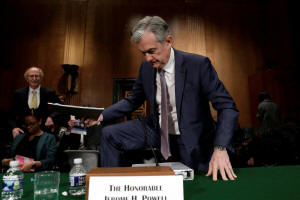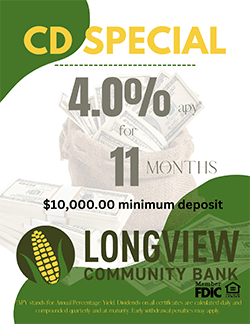Fed minutes to detail debate over rate hike endgame
 Send a link to a friend
Send a link to a friend
 [February 22, 2023] By
Howard Schneider [February 22, 2023] By
Howard Schneider
WASHINGTON (Reuters) - Minutes from the U.S. Federal Reserve's latest
meeting out Wednesday are expected to detail the breadth of debate at
the central bank over how much further interest rates may need to be
raised to slow inflation and cool an economy that has remained stronger
than expected despite tighter Fed policy.
The two-day meeting ended on Feb. 1 with the central bank raising its
target interest rate by a quarter of a percentage point, a return to a
more standard rate hike size after a year of sequential three-quarter
point and half-point increases.
In a press conference following that meeting, Fed Chair Jerome Powell
said the return to smaller rate hikes was meant to allow a more stepwise
hunt for a possible stopping point, and that officials spent the session
"talking quite a bit about the path forward" as the central bank nears
what may be the end of its hiking cycle.
But that session was also held before key data releases that showed
unusually strong job gains in January, and showed less of a slowdown in
inflation than anticipated - a trend expected to continue this week with
the release Friday of a report on how the Fed's preferred inflation
index fared in January.

The Fed uses the Personal Consumption Expenditures price index in
setting its 2% inflation target. Economists polled by Reuters estimate
it improved only modestly in January, falling on an annual basis from
4.4% to 4.3% once the more volatile food and energy components are
excluded. That core inflation measure is seen actually increasing on a
month-to-month basis to 0.4% from 0.3%.
Since the meeting, some Fed officials have acknowledged they had pushed
to continue with larger half-point rate increases at the last meeting,
while investors have boosted their own outlook for where the Fed may end
up.
Most do not see the Fed returning to larger half-point increases now
that they have slowed.
But they do see the Fed moving rates higher than previously anticipated
and leaving them at an elevated level for longer as well - a change in
sentiment likely welcomed by Fed officials concerned market pricing had
understated their resolve in bringing inflation back to the 2% target.
[to top of second column] |

Federal Reserve Board Chairman Jerome
Powell steps over a chair after a Senate Banking Committee hearing
on The Semiannual Monetary Policy Report to the Congress on Capitol
Hill in Washington, U.S., February 12, 2020. REUTERS/Yuri Gripas/File
Photo

The minutes, to be released at 2 p.m. ET (1900 GMT), may show just
how tilted toward hawkish policy the Fed remains, particularly at a
meeting that proved to be the last for former Vice Chair Lael
Brainard, who was among the Fed's most sensitive to the risks facing
the economy under tight monetary policy and the most detailed in
sketching out reasons for why inflation might slow faster than
expected.
Brainard, who left the Fed to head President Joe Biden's National
Economic Council, embodied one aspect of a discussion between those
who advise caution in further rate hikes because the economy still
has not fully adjusted to what the Fed has done to date, and those
who feel businesses and households are proving more resilient than
expected to rising interest rates and may need the restraint of even
higher interest rates for inflation to fully regress.
While there was little disagreement last year over what the Fed
needed to do as inflation raced to a 40-year high, the central bank
is now in a more two-sided discussion "to find out to what extent
the resilience of the economy thus far reflects time lags on
monetary tightening versus a higher short term neutral rate" needed
to cause businesses and households to slow spending, analysts for
ISI Evercore wrote in an analysis ahead of the minutes.
While the minutes released today are particularly dated, given the
jobs and inflation numbers released since then, policymakers will
update their views next month with new economic and interest rate
projections issued after the Fed's March 21-22 meeting.
(Reporting by Howard Schneider; Editing by Dan Burns)
[© 2023 Thomson Reuters. All rights
reserved.]
This material may not be
published, broadcast, rewritten or redistributed.
Thompson Reuters is solely responsible for this content.
 |